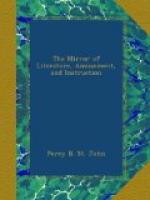—“And my flesh’s hair upstood,
’Twas mine own similitude.”
—I cannot relate what followed, for my senses deserted me. On recovering, my mysterious visiter had departed without leaving the slightest clue by which I might fathom the impenetrable secret of my persecutions. I have sometimes imagined that they arose from one of those wonderful natural resemblances which in some instances appear to be well authenticated; but, natural or supernatural, they changed the current of my life. Unable to endure the disgrace of being pointed at as a convicted felon, I converted my property into money, and, under another name, I now live respected in a foreign land.—Ibid.
* * * * *
THE SELECTOR; AND LITERARY NOTICES OF NEW WORKS.
* * * * *
“FASHIONABLE TALES.”
Lord Normanby has written one of the best, if not the best, of this class of works, the tendency of which is in most instances of questionable character. But they give a tone to the reading taste of the day, as the recent circumstance of two of them forming the first subject of three literary reviews will sufficiently attest. The work to which we specially allude, is Matilda, a Tale of the Day, the noble author of which has just produced another of the same stamp, entitled Yes and No, to whose sketches and portraits we shall shortly introduce our readers. It will be seen that his lordship is no mean artist, nor does he belong to the novel-making tribe, whose hole-and-corner curiosity has made us as familiar with the Corso as we are with our own Bond-street. But the following snatch from Yes and No proves that these smatterers of fashion—these clippers of reputation—are encouraged by some portion of that class whose vanities they affect to expose:—
SCENE—A “Hall” in the Country.
“It is always as well here to know who one’s next neighbour is,” continued Fitzalbert, “for this is not one of those snug parties where one can do or say what one pleases without observation.” “How do you mean?” asked Germain. “Why, Lady Boreton encourages these literary poachers on the manors, or rather manners of high life; she gives a sort of right of free chase to all cockney sportsmen to wing one’s follies in a double-barrelled duodecimo, or hunt one’s eccentricities through a hot-pressed octavo. Not that they are, generally speaking, very formidable shots—they often bring down a different bird from the one they aimed at, and sometimes shut their eyes and blaze away at the whole covey; which last is, after all, the best way. Their coming here to pick out individuals is needless trouble. Do you know the modern recipe for a finished picture of fashionable life? Let a gentleman_ly_ man, with a gentleman_ly_ style, take of foolscap paper a few quires; stuff them well with high-sounding titles—dukes and duchesses, lords and ladies, ad libitum. Then open the peerage at random, pick a supposititious author out of one page of it, and fix the imaginary characters upon some of the rest; mix it all up with quantum suff. of puff, and the book is in a second edition before ninety-nine readers out of a hundred have found out the one is as little likely to have written, as the others to have done what is attributed to them.”




